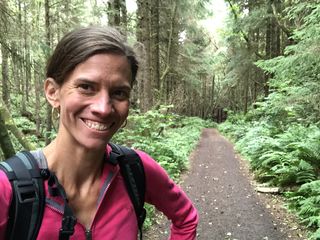Loneliness
How a Long-Distance Hiker Learned to Love Solitude and Boredom
Jennifer Pharr Davis explains how to grapple with social isolation.
Posted April 24, 2020

When Jennifer Pharr Davis graduated from college, she felt lost. Searching for time and space to reflect on her future, the North Carolina native decided to hike the Appalachian Trail.
Time in nature ultimately became her future. Davis transformed into a skilled hiker and backpacker who has covered more than 14,000 miles on foot. She set records for the Long Trail in Vermont and the Bibbulmun Trail in Australia. In 2011, she clinched the record for the fastest known time on the Appalachian Trail, traversing the 2,190-mile trail in 46 days, 11 hours, and 20 minutes (a record later beaten by Scott Jurek in 2015). Davis also founded Blue Ridge Hiking Company in Asheville, North Carolina, where she lives with her husband and two children.
As the coronavirus crisis has pummeled people around the world with fear, anxiety, boredom, and both loneliness and too much togetherness, the months Davis has spent alone in the wilderness may offer valuable insight for grappling with the emotions of the pandemic.
What skills did you gain when you first hiked the Appalachian Trail?
My problem-solving and ingenuity improved, because I mostly hiked by myself on that first journey. If something went wrong, I had to figure out a solution without anyone else around. That was scary at first, but it also made me feel confident and independent.
What’s an example of how you developed self-reliance?
I was in a snowstorm in the Smokies, and all of a sudden it was very difficult to follow the trail. The entire Appalachian Trail is marked extremely well, but it’s marked with white rectangles painted on trees from Georgia to Maine, so it was hard to find any trail markers in the snow.
All I wanted to do was follow someone. All I wanted was footsteps. But I just had to take a deep breath, pull out my maps and guidebooks, and do the best I could to go in the right direction. I learned how to take a deep breath, use my resources, and try to make a plan, even in stressful situations.
At another point, I was hiking across a long exposed ridgeline, and the wind, snow, and sleet were hitting my face, so I ducked my head and closed my eye. When I got back to the forest, I lifted up my chin and couldn’t open my eye, because it had frozen shut.
What went through your mind when you realized your eye couldn’t open?
I thought, “I didn’t know that could happen!” I didn’t know your eye could freeze shut. Then I threw off my glove, picked miniature icicles off my eyelash, wiped frozen crust from the corners of my eyes, and then I regained my sight.
At that point, I was so frustrated and anxious and stressed that all I wanted to do was cry, and then I was like, “I can’t cry, my eye will freeze shut again!” So I did not cry. I got out my map and found the direction I needed to go and kept going.
What’s the longest hike you’ve done alone?
The Pacific Crest Trail, which runs from Mexico to Canada. It was about four months. There were a few nights I camped out with other people, but I was by myself about 80 percent of the time.
What was your experience of solitude? How did you learn to be by yourself?
When I started hiking and backpacking, one of my fears was that I’d feel lonely. I was dreading that. But by the time I got to the end of the trail, I realized that was one of the best parts of the experience for me. The self-knowledge I gained came through spending time by myself. I learned what made me laugh when no one else was around, and what made me cry when there was no hope of sympathy.
What made you laugh?
One time I cracked up because I was hiking down the trail, and all of a sudden I saw something dart out of the underbrush toward me. It was a mama grouse who had babies nearby. She was protecting her brood and running at my feet. I yelled and hopped up in the air and ran down the trail, and then just died laughing, because it was like being attacked by a chicken in the middle of the woods.
What made you cry?
I love grieving on the trail, because the trail doesn’t try to fix it. It’s a place where you can truly let it out and be in the moment. I also realized that a lot of times when I cry, it’s for a reaction. On the trail, my tears weren’t going to bring any sympathy. There were times where I just had to keep going and not waste energy on tears. I’m all about showing emotion, but on the flipside, it’s great to feel tough and to not always need an emotional release in order to feel resolved.
Was there ever a time when you felt truly, deeply alone?
No. Before my first hike, I remember journaling that I thought I was going to feel lonely. But I realized that I felt lonely more off-trail. I feel lonely if I’m in a group and I’m not connecting or I’m obsessing about my insecurities. On the trail, there was a strong sense of connection and belonging. I was part of nature.
Did you have feelings of boredom?
Oh yeah. That was another fear before I started. Especially as a 21-year-old, I was like, “Oh my gosh, I’m going away from friends and family, I’m going to be so bored.” I remember the first time I felt bored it was just so awkward, because we don’t allow ourselves to feel bored. I was like, “Nooo, it’s happening! Please, a squirrel, a person, something, happen!” But the more I got used to the boredom, the more I was like oh, this is awesome.
Did the ability to enjoy boredom happen naturally or did you work to achieve it?
So much of the trail is inoculation. I remember I was so scared of snakes when I started, because I was supposed to be scared of snakes. And then I saw one and I was scared. And then I saw two and I was scared. And eventually I saw 20, and I was like, I’m not that scared. They never wanted anything to do with me!
I think that was the same for being bored. I was like, “Oh no, I’m bored. I shouldn’t be bored—being bored is bad.” Maybe the next day I felt like that again. Maybe the next day I felt it a little less.
The trail also removes expectations. I was geared toward meeting other people’s expectations, whether it was a social cue or acting a certain way, and when the expectations were removed, it was easier to be myself and relax my mind.
Are there other ways in which your experience prepared you for quarantine?
I’m a big believer in exercise. As much as people can during this time, get out and walk. The first night I set up my tent by myself I was so scared. But I was also tired. I had never hiked 15 miles with a pack on my back before. I was really scared for three or five minutes, and then I just fell asleep. In times of uncertainty and anxiety, exercising is helpful not just in that moment but to get rest later in the day.
Reading and journaling have always been a big part of my hikes, too. I love journaling because thoughts can ruminate and get stuck. When I journal, I release the thought and get it out of my mind. I love reading because it can transport you to all different places. When I was hiking in Australia, having very few conversations, I would read out loud because there was something to hearing a human voice, even if it was my own.
You’ve also completed long hikes with your husband. How did you learn to navigate constant togetherness?
When we first started backpacking together, we were backpacking the Colorado Trail. I don’t think he stopped talking for the first three days. I turned around and was like, “You know you don’t have to talk the whole time!” He said, “Oh, I thought you wanted that!” He was trying to entertain me, but it was driving me crazy. We had to open up and communicate.
Another thing on that journey was I knew how to backpack really well. This was his first time on a long trail. It was easy for me to say, “This is what we do, here’s where we going, and this is what we need.” But that took all the fun out of it for him. I learned to allow him to make his own mistakes. Even if it was more efficient for me to call the shots, it wasn’t really a shared experience.
Your husband was your support crew when you set the overall record for the Appalachian Trail. What did that experience teach you about your relationship?
We started in Maine, and I got shin splints on day three. I got to New Hampshire and had horrible weather. I was going over a 6,000-foot ridgeline and it started to sleet, and I became hypothermic. There was no thought of the record on the trail. I was just thinking: It’s dangerous, I’m stumbling, I’m trying to sing out loud and mumbling all my words, I’m losing it.
My husband and I didn’t have any cell signal, so there was no way to communicate. But he knew that up in the high elevation, where I was, the weather was going to be bad, and he knew I had shin splints and had already hiked through cold rain for a day and a half. That summer he was limited in his mobility, because he recently had an ACL surgery. But in that instant he thought, “I’ve got to get to my wife.” He packed up our gear and walked several miles to find me.
By that point, I was shivering, barely moving down the trail. He set up our tent, got me into double sleeping bags, fed me, and nursed me back to health. He knew me and he knew the conditions, and he was willing to meet me where I was. That’s so much of being in a partnership—even when people can’t communicate what they need, a good partner tries to anticipate that need.
A few days after the hypothermic incident, I got really sick. After the shin splits and sleet storm and now horrendous diarrhea, I decided I was done. At the next trail crossing where my husband was waiting for me, I told him, “I’m done with the trail.” I thought he would be relieved, because it was brutal on both of us, and it was definitely my dream, not his.
Instead, he looked at me and said, “If you really want to quit, that’s fine, but you can’t quit right now, because right now you feel too bad to make a good decision.” He gave me what I needed and he drove off. And it’s hard to quit without a ride. In that moment, I felt frustrated and abandoned. I drank water and took medicine, and within a few hours, I was feeling better. I realized that what my husband had given me was accountability. In that moment, he knew I was capable of more.




